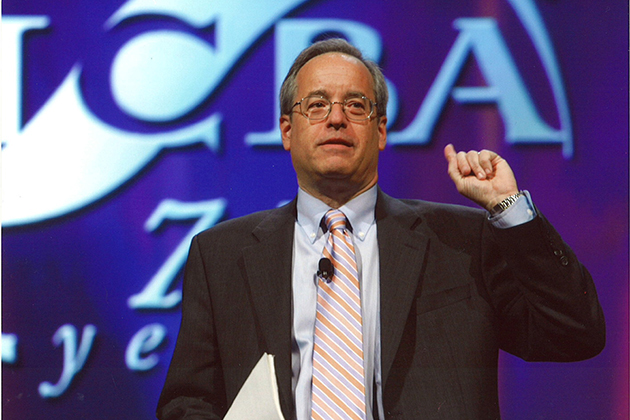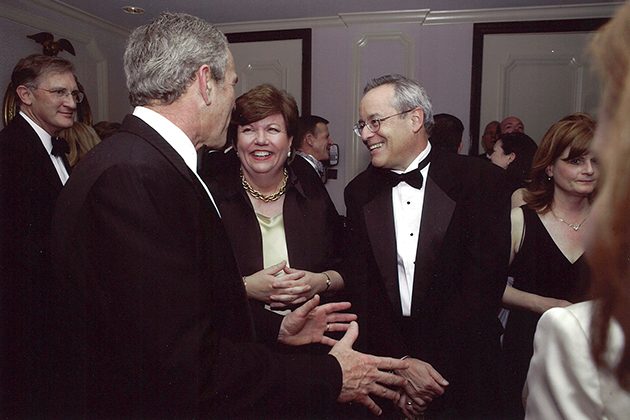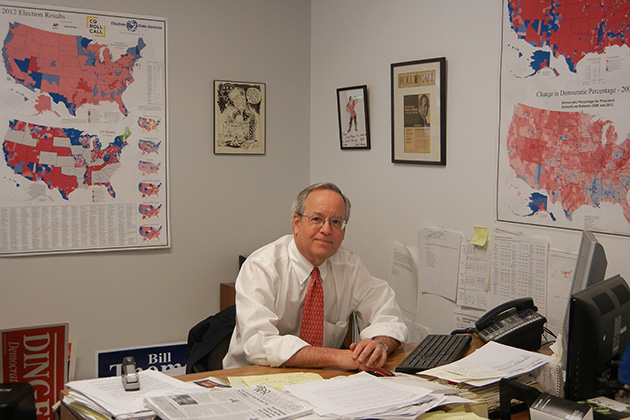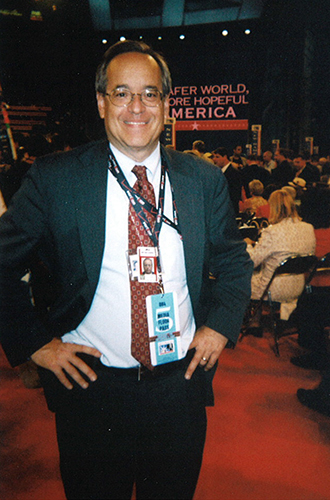
Political analyst and journalist Stu Rothenberg ’72 MA, ’77 Ph.D. is one of UConn’s most notable alumni. His illustrious 35-year career includes interviewing then-unknown candidates Barack Obama; John Edwards, former senator from North Carolina; and now-Congressman Paul Ryan of Wisconsin.
Rothenberg is editor and publisher of The Rothenberg Political Report, a nonpartisan, non-ideological political newsletter covering U.S. House, Senate, and gubernatorial campaigns. Widely respected in Washington political and journalistic circles, his forecasts and analyses can have a profound effect on the ability of a candidate to raise money and create momentum.
He has been a frequent guest on “Meet the Press,” NBC TV’s “Today Show,” “This Week,” “Face the Nation,” “PBS NewsHour,” and “Nightline.” He served as a political analyst for CBS News, and prior to that, as a CNN political analyst for more than 10 years. Network executives and political pundits describe him as “articulate,” “authoritative,” and “plugged in.” He has also contributed to The Washington Post, The Wall Street Journal, and The New York Times. And in addition, he regularly pens a column for the Capitol Hill newspaper, Roll Call.

Mother Nature is partly responsible for paving Rothenberg’s career path. He was at home one snowy day in 1987 when the phone rang early in the morning and someone from “One on One,” a syndicated show hosted by John McLaughlin of The McLaughlin Group fame, called. Washington was paralyzed by a blizzard and the producer wanted to know if he was available to do the show, since Pepsi co-founder and CEO Don Kendall, who had been booked as the guest, couldn’t get down to D.C. He asked how quickly Rothenberg could get to WRC-TV, the NBC affiliate in D.C.
“I said I could get down there in half an hour, and I jumped into my car and drove there,” he says. “After the show wrapped, I knew that I could succeed as a political analyst and do television.”
From professor to political journalist
For a man who makes his living by forecasting, Rothenberg’s career path wasn’t what he originally predicted. “My father worked in my uncle’s shirt business,” he says. “During my generation, if teenagers from mid-to-upper-scale New York City Jewish households didn’t go into the family business, they typically went to college and grad school or law school. At the time, I remember wondering who would possibly pay me to do anything. I was bad at math, which limited my options, and I was quite shy. Plus, I was terrible in shop class, so I knew I couldn’t build anything. I simply assumed that my best option was to teach.”
Rothenberg earned his bachelor’s degree cum laude in government from Colby College in Maine. He later received his master’s degree and doctorate in political science from UConn, specializing in international relations and foreign policy. There he took a course on U.S. foreign policy during the Cold War with the late Professor Garry Clifford.
“All my classmates were older and more confident than I was,” recalls Rothenberg about his first semester in grad school. “I never realized Garry was only in his second year at UConn. I looked up to him, and he helped me overcome my nervousness about getting through grad school. He gave me the self-confidence I needed. I have many fond memories of UConn.” Rothenberg and Clifford remained friends until Clifford’s death this past spring – despite the fact that Rothenberg is a committed Yankees fan and his former professor was a devoted Red Sox fan.

With multiple degrees to his name, Rothenberg was hired as a sabbatical replacement to teach political science at Bucknell University in Pennsylvania for three years. He interviewed at several colleges and universities for tenure-track positions, but didn’t receive any offers. So he sent around his résumé and was hired by the Free Congress Foundation, a conservative think tank, to work on its newsletter, The Political Report. Within five months he became the editor, and 10 years later, in 1989, he purchased the newsletter.
These days, Rothenberg’s calendar is booked with speaking engagements and deadlines. His average day is spent reading emails, fielding calls from national and regional political reporters, meeting and interviewing political candidates, and writing. He interviews more than 150 political candidates per cycle.
For his political insights, he relies on solid research that he conducts with his deputy editor, Nathan L. Gonzales. They have an expansive and enviable network of contacts that provides him with polling numbers and insider information.
A dark moment
Rothenberg says his most challenging experience came when his then 27-year-old son, Ben, was in a near-fatal car accident in 2009.
At the time, he and his wife Elaine, a tenured professor of Russian at the University of Maryland, Baltimore County, worried about their son’s future quality of life. Fortunately, however, he recovered completely, and walked out of the hospital three months after the accident.
The couple also have a daughter, Julia, who works in the communications and branding field.
Almost two years later, Rothenberg wrote a poignant column in Roll Call about his son’s ordeal as he examined the challenges facing former Arizona State Rep. Gabrielle Giffords, who suffered a brain injury from an assassination attempt. “That piece garnered the most reaction to any article I’ve ever written,” he says.
The last word

Rothenberg says the political landscape has dramatically changed since he began as a political journalist.
“Liberals watch MSNBC and listen to NPR radio, while conservatives watch Fox News and listen to Rush Limbaugh. It’s led to the coarsening of our political discourse and culture,” he says, noting that new technologies also have allowed everyone to broadcast their own opinions on Twitter and the Internet.
He hopes for greater civility and common purpose. “People may have different visions for the country. But it’s not about good or evil, simply different priorities. I’d like to see a change in the tenor and tone of our conversations.”
He’d like to see a shift in the media’s focus, too. “Too many in the media act as if every day is a crisis,” he says. “They are all about hype and hysteria. I’d like TV networks to talk less about the cold weather in Minnesota or rain in Texas, and more about real news stories. Our focus on celebrity needs to recede a bit.”
When asked about his predictions for the upcoming mid-term elections, Rothenberg says, “Ask me on Oct. 15, after I’ve studied the latest data.”



